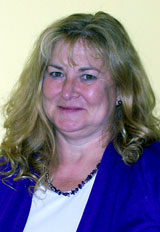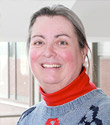Nov 14, 2018
Advance Care Planning: Strategic for All Adults, Even the Healthy
 Serious illness
and chronic conditions don't discriminate by age. A
25-year old might have an accident resulting in a serious
brain injury. A healthy octogenarian may require an
emergent surgery, with age and cause alone influencing a
surgical outcome with significant disability. People with
stable chronic illnesses suddenly decompensate and
interventions offered by the healthcare team might come
with no promises for return to stability. All of these
situations can result in an individual being unable to
speak for themselves, short or long term. Who makes their
decisions then? Who calls the shots on healthcare
interventions? Rural or urban, young or more senior,
experts and advocates said advance care planning answers
these questions.
Serious illness
and chronic conditions don't discriminate by age. A
25-year old might have an accident resulting in a serious
brain injury. A healthy octogenarian may require an
emergent surgery, with age and cause alone influencing a
surgical outcome with significant disability. People with
stable chronic illnesses suddenly decompensate and
interventions offered by the healthcare team might come
with no promises for return to stability. All of these
situations can result in an individual being unable to
speak for themselves, short or long term. Who makes their
decisions then? Who calls the shots on healthcare
interventions? Rural or urban, young or more senior,
experts and advocates said advance care planning answers
these questions.
Advance care planning, or ACP, is a process centered in patients having proactive conversations about the care they might want to receive in situations where they are unable to speak for themselves. Experts say those proactive discussions actually give patients and families unprecedented power when it comes to the dynamics of healthcare decision-making.

Making Choices Michigan's (MCM) Community Coordinator Dr. Carol Robinson addresses national audiences to share information about Michigan's community-based ACP program. She served as a surrogate decision-maker for a family member and uses a personal story to illustrate how ACP can work.
"My mother-in-law was in a care facility due to dementia," Robinson said. "She was found on the floor, unresponsive. Instead of transporting her to the hospital, I asked them to settle her back in bed. She was in no pain. The staff expressed surprise that I 'didn't want to do anything.' I assured them I was doing something. I was honoring her wishes. Shortly, she regained her baseline with no interventions."
The staff expressed surprise that I 'didn't want to do anything.' I assured them I was doing something. I was honoring her wishes.
Robinson said this anecdote exemplifies two important action items ACP advocacy groups promote: designating a healthcare spokesperson and having open conversations around quality of life issues. She further explained that these action items go hand in hand and are important for everyone, starting at age 18 and for rural and urban alike.
Other experts note that examples like Robinson's show how ACP can help assist families and designated agents with in-the-moment medical decision-making. "Honoring wishes" can often be easier than the burden of guessing what loved ones would want.
Dr. Rebecca Aslakson, anesthesiologist, palliative care physician, and critical care provider, has an ACP research interest, including assisting with studies around perioperative education that can be used by surgeons for their patients with advanced age and serious illness. Like Robinson, Aslakson emphasized the importance of having both a designated healthcare agent or proxy and having discussions around personal values and quality of life.
"When it comes to discussing healthcare choices that impact quality of life, what's right for one person, is terribly wrong for someone else," Aslakson said. "There is no one size fits all. In fact, there is not even one size that fits most."
Robinson said that her organization, based in Grand Rapids, uses an evidence-based process for ACP and was the first of only a limited number of fully community-based ACP models in the country. In 2012, MCM educated nearly 550 individuals and almost 60% completed an advanced directive (AD). Now, they've shared ACP education with 7,000 individuals, hundreds who've completed an AD. Combined with other community efforts, Robinson said nearly 44,000 plans have been centrally uploaded to Great Lakes Health Connect, a statewide health information exchange (now part of the Michigan Health Information Network Shared Services).
Though the majority of their work is urban, Robinson said they connect with patients in surrounding rural areas and she's well acquainted with the access issues rural patients encounter to receive ACP guidance, including those that come with geography.
"My colleague and I were driving out to do a hospital-generated referral for a rural patient," she said. "We had the patient's address and a good map, but even an hour past the appointment time, we still hadn't located the patient's home. Then my cell phone rang. It was the patient we were supposed to be seeing. She said, 'Are you looking for us? We can see the road dust from your car and we realized that because we're off the main road behind the trees, you might not be able to find us.' But this challenge didn't take anything away from the value our visit brought to the 4 generations of that family in that home."
ACP Conversations: The Importance of Clinical and Non-Clinical Partners
 Registered nurse and Executive
Director for Hospice Services, Inc. &
Palliative Care of Northwest Kansas in
Phillipsburg, Kansas, Sandy Kuhlman talked about how
their organization in northwest Kansas is folding ACP
into their new palliative care efforts. In an area with
relatively few primary care providers, her organization
has been delivering hospice care to
16 counties. They've recently hired a hospice and
palliative care physician, but Kuhlman said she
recognizes the need for their entire organization to step
in and do ACP because a "single provider shouldn't be
expected to do it all." As they slowly build their
palliative care program, one approach Kuhlman said her
teams will use is having informational discussions with
the area's clinic nurses.
Registered nurse and Executive
Director for Hospice Services, Inc. &
Palliative Care of Northwest Kansas in
Phillipsburg, Kansas, Sandy Kuhlman talked about how
their organization in northwest Kansas is folding ACP
into their new palliative care efforts. In an area with
relatively few primary care providers, her organization
has been delivering hospice care to
16 counties. They've recently hired a hospice and
palliative care physician, but Kuhlman said she
recognizes the need for their entire organization to step
in and do ACP because a "single provider shouldn't be
expected to do it all." As they slowly build their
palliative care program, one approach Kuhlman said her
teams will use is having informational discussions with
the area's clinic nurses.

"In addition to the work our hospice spiritual lead and our board does with community outreach on this aspect of care, we'd like to start doing low key conversations about palliative care and advance care planning with the office nurses since the providers are so busy," Kuhlman said. "Office nurses help care for patients and families also. We want everyone to know they are our customers — patients, families, nurses, physicians. We want to partner with them and not only be their extra layer of support for patients with serious illness and chronic diseases, but also help with advance care planning."
Though often considered the purview of hospice or palliative care teams, ACP advocates and experts shared that should not be the case. Robinson pointed out that recent literature supports ACP being done by specially trained non-clinical professionals in addition to trained laypersons. She believes an ACP-trained lay workforce can especially be helpful with ACP access in rural areas.
We can train others to bring ACP to patients and families so when they are in the situation of making decisions, they are prepared, whether or not the physicians are.
"Most physicians and nurses haven't been taught how to have these conversations because it's not standardized curriculum yet," Robinson said. "We can train others to bring ACP to patients and families so when they are in the situation of making decisions, they are prepared, whether or not the physicians are. It's OK to let patients know their doctors might need help with this because they've not received the training. Patients need to know they can be very active in the decision-making process."
Training Healthcare Providers
Medical schools and residencies train workforce
destined for both urban and rural areas to care for an
increasingly older population as well as a population
where modern healthcare has brought about increasing
life spans for many with chronic and serious illnesses.
Although considered an integral part of providing
palliative care, ACP experts believe all medical
providers should be familiar with the basics of advance
care planning. Most nursing and medical schools have no
such curricula. One ACP advocate said, "it almost seems
like educators are setting their learners up for
failure when they don't provide this type of education.
It's counterintuitive when you understand that the
patient today's med student will see most often will be
an older patient with chronic disease." Experts and
advocates said these concerns are the a driving force
behind the
Palliative Care and Hospice Education Training Act.
Robinson also shared the importance of collaborating with
interfaith councils, faith-based leaders and their
organization's designees, in addition to local attorneys.
 "Faith communities with trained ACP facilitators in
their midst are very effective with advance care
planning," Robinson said. "Then patients and families
have that trusted person from their community with shared
beliefs, especially when the facilitator has been
designated by the faith leader.
"Faith communities with trained ACP facilitators in
their midst are very effective with advance care
planning," Robinson said. "Then patients and families
have that trusted person from their community with shared
beliefs, especially when the facilitator has been
designated by the faith leader.
"As a result of a roundtable for physicians and attorneys, our area attorneys now upload planning documents into the health information exchange since they understand how advance planning documents aren't helpful when patients don't bring copies to the hospital and the other copy is locked up in an office when it's needed."
ACP Documents
Advance healthcare planning decisions are sometimes
completed as part of formal estate planning, the latter
which usually involves an attorney. Experts shared that
though each state has specific forms for a healthcare
proxy decision-maker and an advanced directive, most
require only witnesses and a notary public, not an
attorney or a healthcare provider.
Advocates emphasized that attorneys are important partners in ACP. In October 2016, the Journal of the American Bar Association Commission on Law and Aging reviewed the state-to-state portability of the advance directive. A final conclusion highlighted the overall intent of the directive: "The value of this any-kind-of-expression approach is a freeing up of the process of advance care planning so that it can flow from the personal communication style, culture, and comfort level of each individual, ideally in dialog with loved ones and health care providers."
ACP Role in the World of Catastrophes
Advocates said they recognize that there are concerns and questions about ACP and emphasized that advance planning doesn't recommend limits to care, but instead is intended to help patients work through their values. If serious illness occurs or a chronic illness becomes less and less stable, patients and their families can then have some confidence with changing their medical goals of care. Experts said those are the conditions often seen in the acute care environment of hospitals, especially intensive care units (ICUs).
Anesthesiologist/palliative care physician Aslakson, who is also a critical care physician and works in that environment, said an ICU can be described as a "world often defined by catastrophes." Her experiences during her practice in a Baltimore tertiary care center, where up to 25% of their patients were referred from outlying rural communities, allowed her an up-close view on what happens when no ACP has occurred, either because the patient didn't want to talk about it, was afraid of it, considered themselves too young, or had other priorities because it was something that would happen in the future.
They're troubled, perplexed, saying 'I don't know what they would want.' It is agonizing for clinicians to see these struggles, especially because we understand that for some patients, some treatments are desired, but another patient might see that same treatment as torture.
"In those hours of critical illness when decisions need to be made, family members sometimes are really stuck," Aslakson said. "They're troubled, perplexed, saying 'I don't know what they would want.' It is agonizing for clinicians to see these struggles, especially because we understand that for some patients, some treatments are desired, but another patient might see that same treatment as torture. This is why advance planning is so important, no matter what a person's age. Choose someone to speak for you and make it clear to them and everyone else what your personal perspective is on quality of life.

"We should also help patients and their families understand that just because an intervention is offered, that doesn't mean that the offer actually fits with the patient's goals of care. Families should be empowered to ask: If I do what you're recommending, what do you think might happen or is likely to happen? If I don't do what you are offering, what is your experience about what will happen? Explore. And recognize that the 'one in a 100' chance of something acceptable happening is also '99 of 100' chance that it won't.
"The easiest question is 'What do you want if everybody agrees you are going to die?' Everybody usually gets on the same page very quickly. The harder question is 'What do you want if not everybody agrees you might die and that you might live with disabilities?' That's where the challenges are."
Aslakson also said it's important for clinicians and attorneys to collaborate and understand each other's professional worlds, collaboration that can happen in rural as well as urban communities.
In the end, reality is way more complex than anything that goes into a directive.
"If advance planning included creating an advanced directive, it's important to recognize that many times they are not helpful," Aslakson said. "State forms are often linked to legal words, such as brain death. 'What do you want if you're brain dead?' But brain dead is dead in most states, so that doesn't make sense to be asking someone what they want if they're dead already. Another frequent question in a directive is 'What do you want if you're in a persistent vegetative state?' Well, by definition, it takes 6 months to formally confirm a persistent vegetative state. So that means 6 months must elapse before your advanced directive takes effect. We need to work with attorneys on getting the right language into directives. I'm in favor of using advanced directives as a scaffolding, but for whoever makes decisions for you, it can't replace the informed conversation you had with your decision-maker and your family. In the end, reality is way more complex than anything that goes into a directive."
Advance Care Planning Tools
Five Wishes, Aging with Dignity
Health Care Decision-Making, American Bar Association
Respecting Choices®, Coalition to Transform Advanced Care
The Conversation Project, Institute for Healthcare Improvement
Advance Care Planning, National Institute on Aging
Starting the Conversation about Health, Legal, Financial and End-of-Life Issues, National Association of Area Agencies on Aging (n4a)

